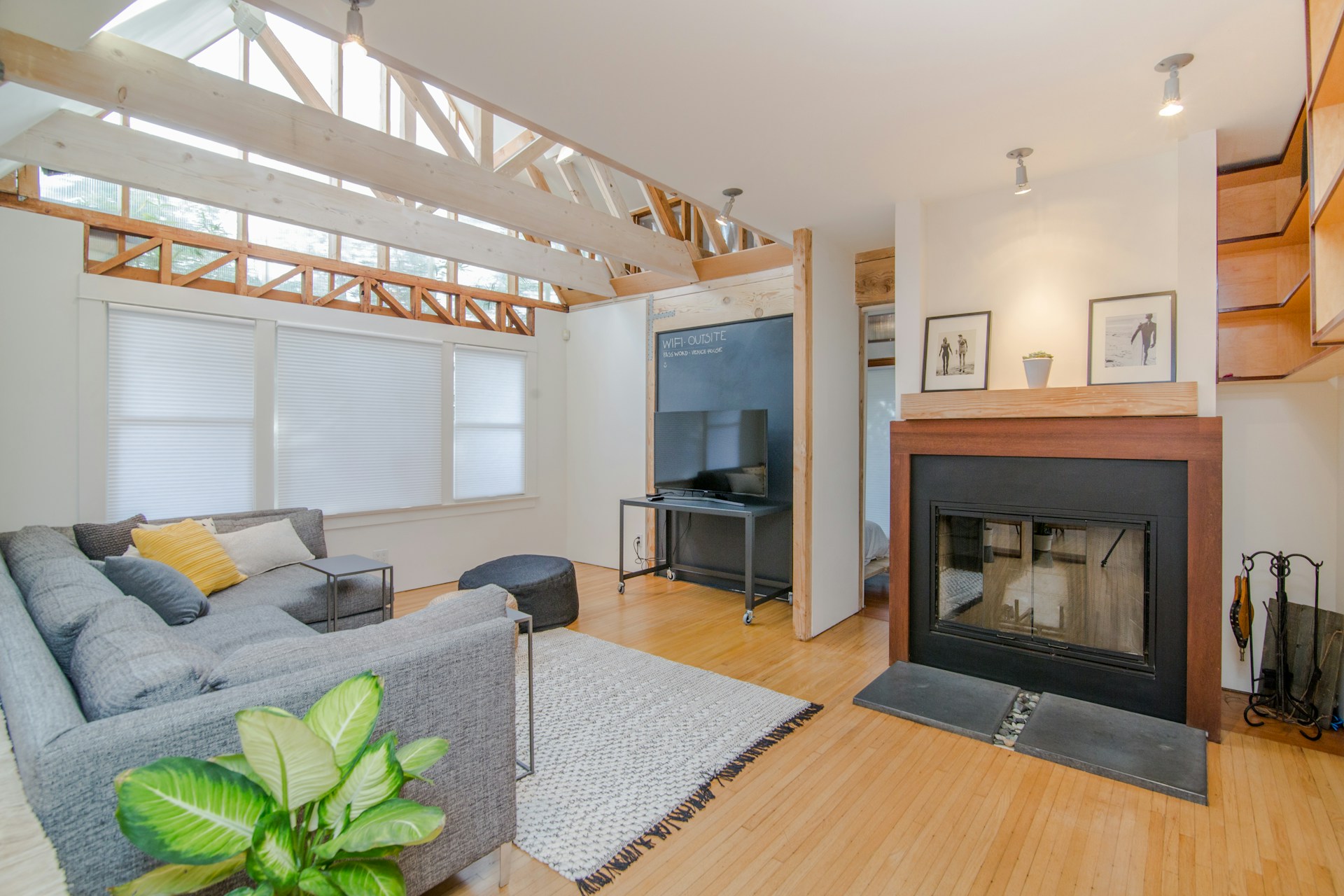Digital Nomads in Gran Canaria: Tips and Complete Guide
Live and work as digital nomad in Gran Canaria. Find out about the best areas of the island, accommodation, co-working and activities.
Gran Canaria, the most populated island of the Canary archipelago, is ranked among the top ten destinations for digital nomads in Europe. This reflects its growing popularity as a place of residence for those working remotely.
With its year-round mild climate, affordable prices and well-developed infrastructure for remote workers, it’s not hard to see why more and more people are choosing this island as their base of operations.
In this article, we’ll give you the reasons you need to move and live as a digital nomad in Gran Canaria. So keep an eye out for information on visas, accommodation and cost of living to help you make the decision to embark on your next destination.
Why choose Gran Canaria to live as a digital nomad?
Gran Canaria offers a unique blend of advantages that have made it a perfect place for digital nomads. Here are some of the key reasons why you should consider this island as your next destination:
1. Great weather all year round
Gran Canaria enjoys a subtropical climate, which means mild and pleasant temperatures all year round.
Temperatures range from 18°C to 26°C, making it a destination to escape Europe’s colder climates and work from a sunny location regardless of the season.
2. Affordable cost of living:
Compared to other European cities, the cost of living in Gran Canaria is low, allowing you to enjoy a good quality of life without having to squander your savings.
Although prices may vary according to location (as in tourist areas), in general, digital nomads can find reasonably priced accommodation, food and activities.
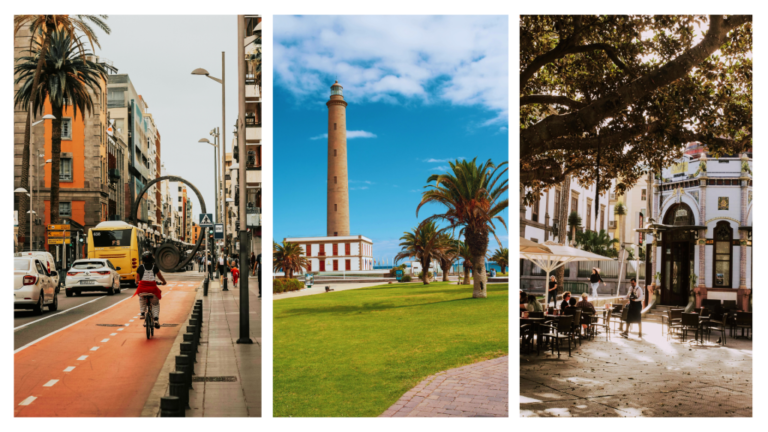
3. Quality infrastructure for remote working
Gran Canaria has a modern infrastructure that includes high quality coworking spaces, good internet connectivity, and flexible accommodation options, such as colivings.
In addition, many areas are well connected to other cities in Spain and Europe, making it easy to move around if you want to visit other destinations.
4. Community of digital nomads:
Gran Canaria is home to an extensive community of digital nomads. There are numerous events, meetups and networking activities where you can meet other remote professionals.
5. Diversity of landscapes and activities
From beautiful beaches to volcanic mountains and green valleys, Gran Canaria is a destination you won’t get bored of.
If you’re an outdoor enthusiast, you’ll have access to a host of options such as hiking, surfing, cycling and water sports, allowing you to combine work with enjoying the great outdoors.
Visas allowing you to reside as a digital nomad in Gran Canaria
Digital Nomad Visa in Gran Canaria
From January 2023, Spain introduced a specific visa for digital nomads that allows remote professionals to reside and work legally in the country for an initial period of one year, with the possibility to renew it for up to 5 years.
Gran Canaria, being part of Spain, is under the same regime. Therefore, if you’re interested in living and working on the island as a digital nomad, this visa is for you.
| Requirements | Details |
| Duration | One year, renewable |
| Income requirements | Proof of income of at least €2,000/month ($2,085.84) |
| Remote working | You must be a remote worker for a foreign company or self-employed |
| Health insurance | You’ll need health insurance to cover the whole period |
| Application | Must be done from outside Spain |
If you’re interested in getting more details about this visa, we recommend you to visit this article on the digital nomad visa in Spain.
Important: If you are a frequent traveler and want to stay connected without worrying about expensive roaming or looking for a new SIM at every destination, Holafly’s subscription plans are for you. With a single eSIM, enjoy internet in more than 170 countries for a fixed price and no surprises on your bill. Travel without limits and connect easily and securely! 🚀🌍

Live and work as digital nomad in Gran Canaria.
Gran Canaria has several areas ideal for digital nomads, each with its own charm and advantages. Below, we explore some of the best options.
Las Palmas de Gran Canaria
Las Palmas, the island’s capital, is the main hub for digital nomads. It’s a city with a wide range of co-working spaces, restaurants and social activities.
Las Palmas has an excellent transport and service infrastructure, making it a very convenient option for remote workers.
Recommended areas within Las Palmas:
- Vegueta: The old town, perfect for those who enjoy the historical and cultural atmosphere.
- Triana: Central and commercial neighbourhood, with many co-working options.
- Puerto de la Luz: Ideal for those looking to be close to the sea, with several co-working spaces in the area.
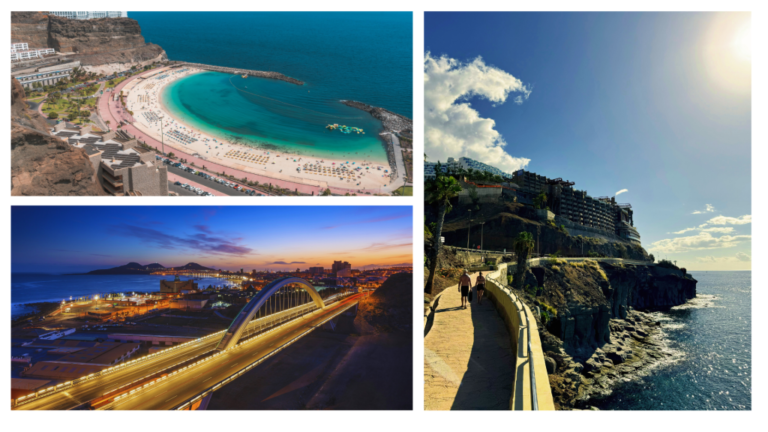
Mogán
If you’re looking for a quieter environment, Mogán is another excellent option. Known for its beaches and natural scenery, this area offers a more relaxed lifestyle, perfect for those who wish to escape the hustle and bustle of the city.
Accommodation and co-living options
Gran Canaria has a variety of accommodation options to suit the needs of digital nomads, from short-stay flats to co-livings.
The Green House
- Location: Las Palmas
- Services: Private and shared rooms, co-working with high-speed internet, swimming pool, common areas for socialising, and activities such as yoga and meditation.
- Prices: Shared rooms from $500-600 per month, private rooms from $800-1,000 per month.
Coliving 1907
- Location: Las Palmas (urban area near Las Canteras beach).
- Services: Private and shared rooms, co-working with high-speed internet, networking activities, and access to nearby cafés and restaurants.
- Price: Shared rooms from $400-500 per month, private rooms from $600-850 per month.
Airbnb
Airbnb is one of the most popular platforms for digital nomads, offering both short and long term stays, from full flats to private rooms in shared houses.
- Prices: Prices in Airbnb vary according to the area and type of accommodation. For a one-bedroom flat in Las Palmas o Maspalomas prices are between $600 and 1,000 per month.
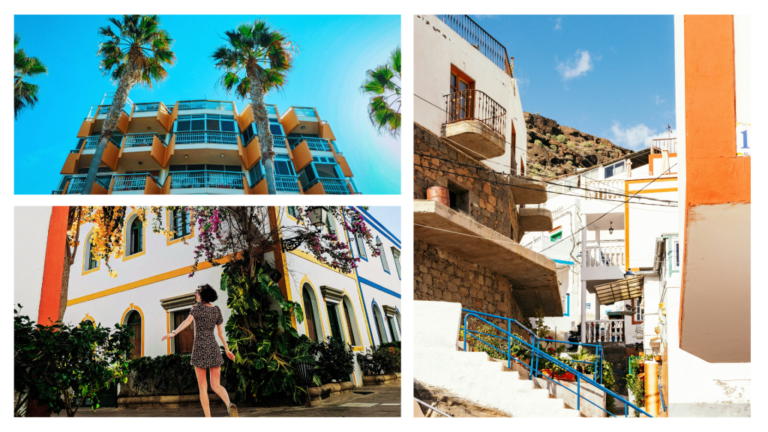
Co-working spaces in Gran Canaria
Black House
Located in Las Palmas, Black House offers shared and private desks, fast internetand meeting rooms, professional and collaborative environment.
Rates start at $150 per month (shared desk) and $400 per month (private office).
Go Coworking
Also in Las Palmas, Go Coworking provides flexible desks, meeting rooms and high-speed wifi, with daily or monthly rental options.
Prices range from $125 per month (hot desk) to $350 per month (private office).
Internet connection
Gran Canaria has good internet coverage in general. Connection speeds vary between 100 and 500 Mbps, depending on the area. Co-working spaces often offer high quality internet.
Without a doubt the most flexible and efficient option to guarantee your connection in Gran Canaria, is the holafly eSIM with which you’ll have access to unlimited high speed data at all times.
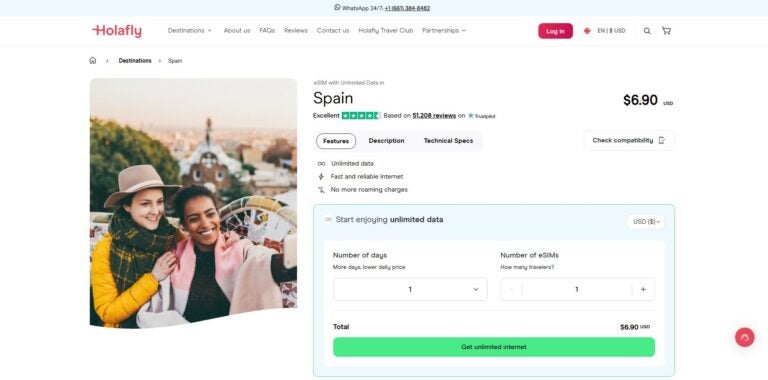
Taxes and fiscal benefits of a digital nomad in Gran Canaria
Tax advantages are one of the main attractions of the Canary Islands for remote workers.
Special tax regime for the Canary Islands
The Canary Islands have their own tax system, different from that of the mainland.
This includes the Canary Islands Special Zone (ZEC), which offers reduced taxes for companies, with corporate tax rates as low as 4% (compared to 25% on the mainland) and an IGIC (equivalent to VAT) of 7% (much lower than the 21% on the mainland).
Digital nomad regime
In 2021, Spain introduced a special tax regime for digital nomads. If you move to the Canary Islands and want to establish your tax residence there, you’ll be able to benefit from these tax incentives, paying less tax than in other parts of Spain.
Tax residence in the Canary Islands
To be considered tax resident in the Canary Islands, you must spend more than 183 days a year in the islands or have your centre of economic or personal interests there.
If you meet these requirements, you’ll be able to benefit from the region’s tax advantages, such as VAT exemption and the reduced IGIC rate (Canary Islands General Indirect Tax).
Income Tax (IT)
If you’re a tax resident in the Canary Islands, you’ll pay personal income tax according to the scale of the archipelago, with tax rates starting at 19% for incomes up to $12,450 and rising progressively according to income.
In short, the Canary Islands offer a favourable tax environment for digital nomads, with lower taxes than on the mainland, incentives for entrepreneurs and an excellent quality of life.
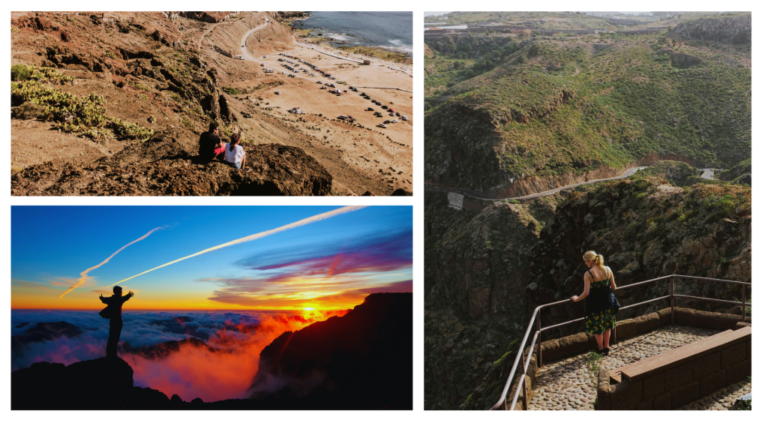
Health system in Gran Canaria
In Gran Canaria, digital nomads can access the public health system if they are tax residents and pay Spanish social security contributions. This entitles them to free or low-cost medical care through the National Health System (SNS).
If you aren’t a tax resident or prefer to avoid bureaucracy, it’s best to take out private health insurance.
Recommended health insurance
| Cigna Global | Estimated cost: $100 to $500 per monthInternational coverage, with options including primary care, hospitalisation, emergency and specialised treatment. |
| Sanitas | Estimated price: $50 to $250 per monthNational and international coverage, with access to general medical care, specialists and hospitalisation. |
Basic expenses of a digital nomad in Gran Canaria
Transport and mobility in Gran Canaria
Transport in Gran Canaria is very accessible. If you move to Las Palmas, public transport (buses) is efficient and cheap. A ticket from Seoul to Busan costs about $50. If you prefer to rent a car, prices are around $25-30 per day.
Managing your finances as a digital nomad in Gran Canaria
In Gran Canaria, digital nomads can opt for both traditional banks and digital banks, each with their own advantages
Recommended banks for foreigners in Gran Canaria
If you prefer a traditional bank, some of the best options in Gran Canaria for foreigners are:
- BBVA: Offers services in English and has an extensive network of ATMs. It’s a convenient option if you make international transfers.
- Santander: Also with an international presence, it allows you to open accounts without the need to be a resident and has competitive rates.
- CaixaBank: Ideal for those looking for commission-free accounts, as long as they make monthly deposits.
Popular digital banks
Digital banks are an excellent option for digital nomads because of their ease of use, low costs and services without international transaction fees. The most recommended are:
- Revolut: It allows you to make international transfers without fees and to manage multiple currencies. Its physical and virtual cards have low ATM withdrawal fees.
- N26: With a user-friendly interface, N26 offers free transfers within the Eurozone and low fees for transactions outside the Eurozone.
Cash withdrawals and ATMs
Gran Canaria has an extensive network of ATMs, especially in tourist areas such as Las Palmas and Mogán.
Some ATMs charge withdrawal fees, especially if you use a foreign card. ATMs generally charge between $1.5 and $3 per withdrawal. If you use Revolut or N26, you can make free withdrawals up to certain monthly limits (e.g. $200 commission-free).
Tips to minimise bank charges
- Use Revolut or N26 to avoid high fees on international transactions.
- If you prefer a traditional bank, check transfer fees and the costs of withdrawing money from international ATMs.
- Be sure to use ATMs of banks such as BBVA and Santander, which tend to have lower fees.
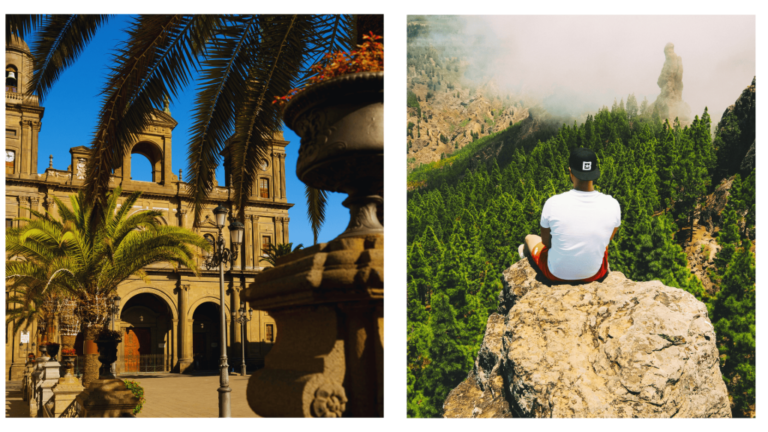
Food costs in Gran Canaria
Where to shop
- Mercadona: With competitive prices and a wide variety of fresh and local products, it’s the most popular supermarket in Gran Canaria. A monthly budget at Mercadona can be between $200 and $250.
- Carrefour: With a good selection of international products, prices are somewhat higher than those of Mercadona, but still reasonable.
- Spar: Another convenient option, ideal for those looking for fresh and quick products.
If you prefer to eat out, restaurant prices range from $8 to $20 a plate. Daily menus in cheaper restaurants range from $10 to $12.
Entertainment for digital nomads in Gran Canaria
Gran Canaria offers a wide range of activities for digital nomads who wish to balance work and leisure time. Here are some entertainment options not to be missed:
Outdoor activities:
- Hiking: Such as the route of Roque Nublo which offers panoramic views of the island.
- Surfing: If you’re a surfer, the beaches of Las Canteras and Maspalomas are known for their good waves.
- Cycling: The island is perfect for cycling, with routes ranging from coastal to mountainous.
Culture and events:
- Las Palmas Carnival: If you’re in Gran Canaria in February, you can’t miss the island’s famous carnival, with parades, concerts and lots of fun.
- Festival de Música de Canarias: This annual event offers concerts by local and international artists during the months of January and February.
Best seasons to be in Gran Canaria
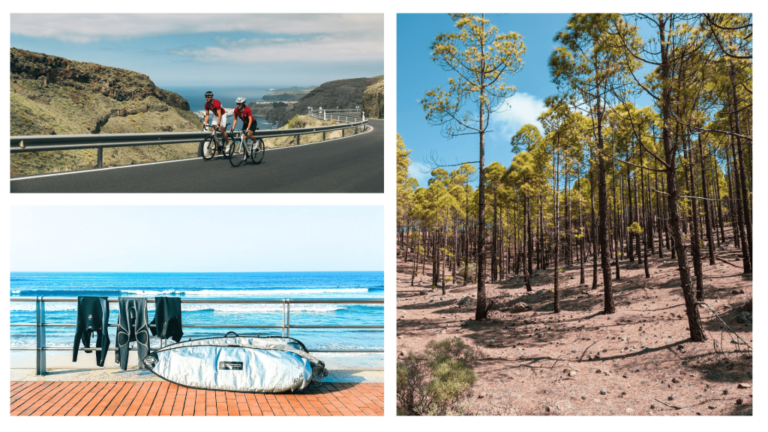
Gran Canaria enjoys a mild climate all year round, making it an excellent destination in any season. However, depending on your preferences, there are better times to enjoy different activities.
Climate and high season
- Spring and autumn (March to November) are the best seasons to enjoy the mild climate, perfect for outdoor activities such as hiking, cycling or water sports.
- Winter (December to February) is also an excellent time to escape the European cold. Although temperatures can be cool at night, the days are sunny and pleasant.
Clothing advice
- In winter, wear light clothing for the day (T-shirts, shorts) and some warm clothes for the evening.
- In summer, you can opt for comfortable and light clothing, ideal for the warm weather.
Cost of living of a digital nomad in Gran Canaria
In short, the cost of living as a digital nomad in Gran Canaria is quite reasonable. A digital nomad could spend between $1,200 and $2,000 per month, but it all depends on their tastes and lifestyle.
With this estimated range you could easily cover the costs of accommodation, food, transport, entertainment and other expenses.
Gran Canaria is a perfect balance between quality of life, affordable costs and the possibility to enjoy a unique island while working remotely.
Live and work as digital nomad in Gran Canaria
Yes, from 2023, Spain offers a digital nomad visa that allows you to reside and work in the country for one year, renewable up to a maximum of 5 years. To get it, you must be a remote worker or self-employed and prove an income of at least €2,000 ($2,085.84) per month.
The monthly cost for a digital nomad in Gran Canaria varies between $1,200 and $2,000, depending on your lifestyle. The main expenses include accommodation, food, transport and entertainment.
Yes, Gran Canaria has an excellent infrastructure for digital nomads, with good internet connectivity, high quality coworking spaces and an active community of remote workers.
Las Palmas is the most popular choice for digital nomads, especially the areas of Vegueta, Triana and Puerto de la Luz. You can also consider Mogán if you prefer a quieter environment.
Some of the most recommended co-working spaces in Las Palmas include Black House and Go Coworking. Both offer shared and private desks, fast internet and meeting rooms. Prices start from €125 ($130.37) per month.
In supermarkets like Mercadona, the average monthly expenditure for a person is between $200 and $250, depending on your shopping habits. Carrefour and Spar are also good options, although they tend to have somewhat higher prices.
Yes, Gran Canaria offers a wide variety of activities, from outdoor sports such as hiking, surfing and cycling, to cultural events such as the Las Palmas Carnival or the Canary Islands Music Festival. In addition, you can enjoy an active social life thanks to the community of digital nomads.





 Language
Language 


















 No results found
No results found






